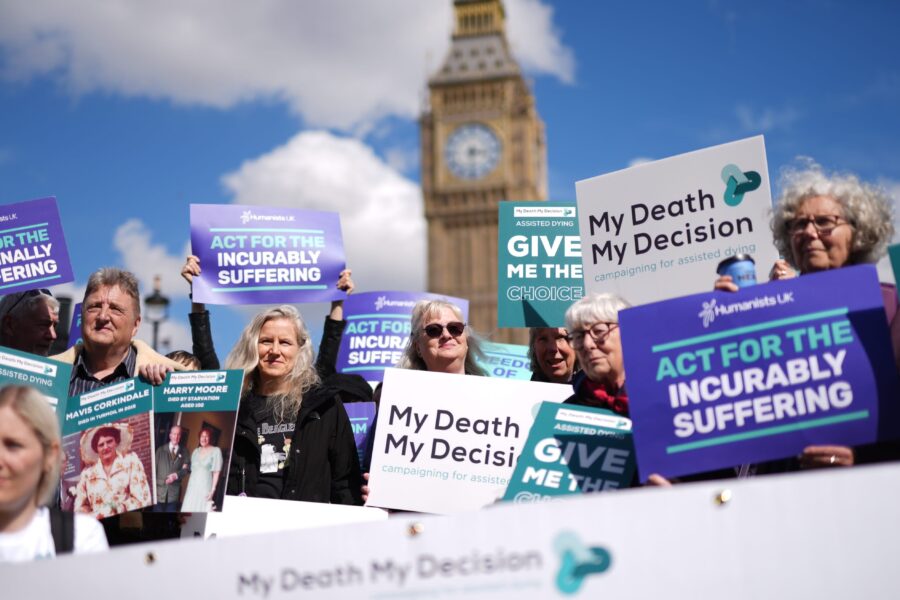MPs are about to vote on an issue that stirs deep emotion on both sides: the legalisation of assisted dying in England and Wales. As someone who lives with life-limiting muscular dystrophy, complicated by heart and respiratory failure, this debate is not an abstract one for me. It’s personal.
When I was three, doctors told my parents I wouldn’t live past 16. When I reached 16, they said I wouldn’t live past 30. As I approach my 60th birthday, I am living proof of how unpredictable medical outcomes can be. And that’s the crux of my concern: how often doctors can get it wrong, and what that could mean if assisted dying becomes part of the state apparatus.
Let me be clear: I fully understand why this debate is so fraught. No one wants to see anyone suffer through unbearable pain at the end of life. But legalising assisted dying, no matter how well-intentioned, crosses a line that we as a society can’t come back from. My life experience and observations tell me that the risks of a slippery slope are very real, and once the door is opened, we may find it harder and harder to prevent expansions of the law to include those with non-terminal conditions or mental health issues.
The Canadian experience: a cautionary tale
The example of Canada is a stark warning for us here in the UK. In 2016, Canada passed its Medical Assistance in Dying (MAID) law, allowing terminally ill people to end their lives with medical assistance. However, the law has since expanded beyond its original scope, removing the requirement that death be “reasonably foreseeable,” and soon, it will extend to people suffering solely from mental illness—a development that has sparked widespread debate.
This progression illustrates how slippery the slope can be. What began as a tightly controlled process for terminally ill patients has now broadened to include those with chronic illnesses, disabilities, and mental health conditions. The fear is that vulnerable people—those who may feel like a burden to their families or the state—could be subtly pressured into choosing death over life.
It’s important to pay close attention to the voices of disabled people in Canada, where a legal challenge has been launched. Disabled Canadians are arguing that they are being pushed towards assisted dying, not out of genuine choice, but due to poverty and a lack of adequate support. This legal challenge underscores the dangerous reality of how vulnerable people may be pressured into ending their lives when the state fails to provide the necessary care.
As a society, we must ask ourselves: is this the direction we want to go in England and Wales? Once we normalise the idea that life can be ended in this way, who’s to say how far we’ll go? Safeguards, no matter how rigorous, have a tendency to erode over time. Today, it might require the agreement of two doctors, but tomorrow, that threshold could be lowered. What happens when the system becomes overstretched, or when financial considerations come into play? The potential for abuses, intentional or not, is immense.
While undoubtedly motivated by compassion, it’s hard to ignore that the financial implications of assisted dying legislation will also attract the attention of government actuaries, particularly within the Department of Health and Social Care and the Department for Work and Pensions. Their role in calculating the costs of health and welfare policies makes it likely that the potential savings of such a law could factor into discussions.
Lessons from the Pandemic: UK’s “Do Not Resuscitate” orders
If you think this is far-fetched, look no further than what happened in the UK during the COVID-19 pandemic. There is ample evidence that “Do Not Resuscitate” (DNR) orders were placed on people with learning disabilities without their, or their families’, knowledge or consent. According to reports from Mencap and other disability rights groups, these orders were issued based on a misguided and dangerous perception that the lives of disabled people were worth less than those of non-disabled people.
The DNR scandal revealed how easily the lives of vulnerable people can be devalued when bureaucratic systems are placed under pressure. When the state starts making decisions about who is worth saving, we are treading on very dangerous ground. Assisted dying could easily open the door to similar abuses.
As someone who already has to have difficult conversations with social services about my deteriorating physical abilities, I can’t help but wonder: how long before a state official might suggest euthanasia as an option during one of these discussions? Today, I am met with sympathy and offers of additional support. But with assisted dying enshrined in law, the conversation could shift from “How can we help you live well?” to “Have you considered ending your life?”
Public opinion and the polling debate
Some may point to polling data that shows broad public support for assisted dying. For example, a 2021 YouGov poll found that 73% of people supported allowing terminally ill adults to end their lives.
It’s understandable that many people feel deeply moved by stories of unbearable suffering. Compassionate responses to extreme cases of pain and suffering are natural, and the desire to alleviate that suffering is valid. However, public opinion is often shaped by these emotional responses, rather than by long-term thinking. While we may feel an immediate need to provide relief in individual cases, we must also consider the broader societal implications.
For example, while legalising assisted dying might seem compassionate in the case of a terminally ill person with intractable pain, it also opens the door to potential abuse and coercion of vulnerable people who may feel pressured to end their lives due to financial burdens or a lack of adequate social support. We need to think about the impact on the most vulnerable—disabled people, those with mental health issues, and the elderly. Once the law changes, we may be unable to prevent its unintended consequences.
Some argue that there is no connection between an 85-year-old in the final months of life being helped to die a pain-free death and a 45-year-old disabled person trying to live their best life. That might be true today, but what about tomorrow, if the assisted dying bill passes into law? How long before these lines blur and the most vulnerable are subtly coerced into considering death over life?
The TV star Dame Esther Rantzen, 83, has stage four lung cancer and is campaigning for people with terminal illnesses and a life expectancy of six months or less to have the right to choose when they die. Prime Minister Keir Starmer recently commented on her case, “I made a promise to Esther Rantzen before the election that we would provide time for a debate and a vote on assisted dying. I’m very pleased that I’m able to make good on that promise.”
It’s understandable why such a high-profile case has brought assisted dying into the political spotlight. However, it raises a troubling question: why is the option of ending life being given such urgency when reforms to social care—reforms that would allow disabled people to live their best lives—remain sidelined? What message does it send when political leaders prioritise assisted dying over improving support for the most vulnerable?
Even more troubling, this weekend has seen calls from some Labour MPs for the assisted dying bill to go further and apply to those who are ‘incurably suffering’. As someone living with an incurable illness, this is deeply unsettling. Should my condition be viewed as reason enough for assisted dying? Where do we draw the line? The term ‘incurable’ is subjective—what might seem incurable today could be manageable tomorrow. Expanding the criteria to include ‘incurable suffering’ risks sweeping in individuals who still have many meaningful years ahead, and it raises the fear that vulnerable people might be subtly encouraged to choose death over life.
The value of palliative care
Rather than broadening the scope of who is eligible to die, we should be putting more effort into improving the quality of life for those who are suffering. High-quality palliative care should be the priority. Yet, in the UK, this vital service is under significant strain due to underfunding and inadequate access. Hospices often rely on charitable donations, resulting in uneven access to care. The Royal College of Physicians has highlighted the growing need for more investment in palliative care, warning that without it, the quality of end-of-life care will continue to deteriorate.
This is where our focus should be—on strengthening palliative care, not opening the door to assisted dying. Dignity in death can be achieved without legalising assisted dying. We must ensure that people have access to compassionate, well-resourced care, which offers comfort and peace in their final moments. If we commit to this, we can ensure that no one feels their only option is to end their life.
A Life Worth Living
“Rage, rage against the dying of the light” is a line from Dylan Thomas’ poem that resonates deeply with me. It’s been my mantra throughout my life, pushing me further than any doctor ever predicted.
Every day is a struggle. Severe fatigue is my constant enemy. I spend nine months of the year housebound, staring at the same four walls. To many, this might seem like a life not worth living. But for me, the joy of a day spent under blue skies and sunshine, hearing birds sing, or celebrating my team Liverpool winning a big match, reminds me of why I fight to live. These moments fill me with the strength to carry on. Despite the struggles to breathe, despite the limitations of my condition, my life is still worth living.
This is exactly why I am so concerned about the push for assisted dying. Vulnerable people, including those with disabilities like mine, could be pressured into thinking that their lives aren’t worth living if they don’t fit a certain standard of health or independence. But as my experience shows, even in the face of severe limitations, life can hold moments of joy, meaning, and contribution. It’s crucial that we offer people the support they need to live with dignity, rather than encouraging them to end their lives prematurely.
Conclusion: A road we must not go down
This is an emotive debate, and I respect those who take a different view. However, my life experience—and the experiences of many disabled people—shows that the risks of legalising assisted dying are too great to ignore. We’ve seen from examples like Canada how a well-intentioned law can quickly expand beyond its original scope, leaving those who feel like a burden to society more vulnerable to coercion or subtle pressure.
Rather than legalising assisted dying, we should be working to improve palliative care and provide the necessary support for those who are suffering. The solution should not be to end lives prematurely, but to ensure that everyone, regardless of their health or disability, has the chance to live with dignity and meaning. Let us strive for a society where the value of life is not determined by health or ability, but by our shared commitment to compassion, care, and support for all.
Share your views on this historic vote and this crucial issue in the comments.






